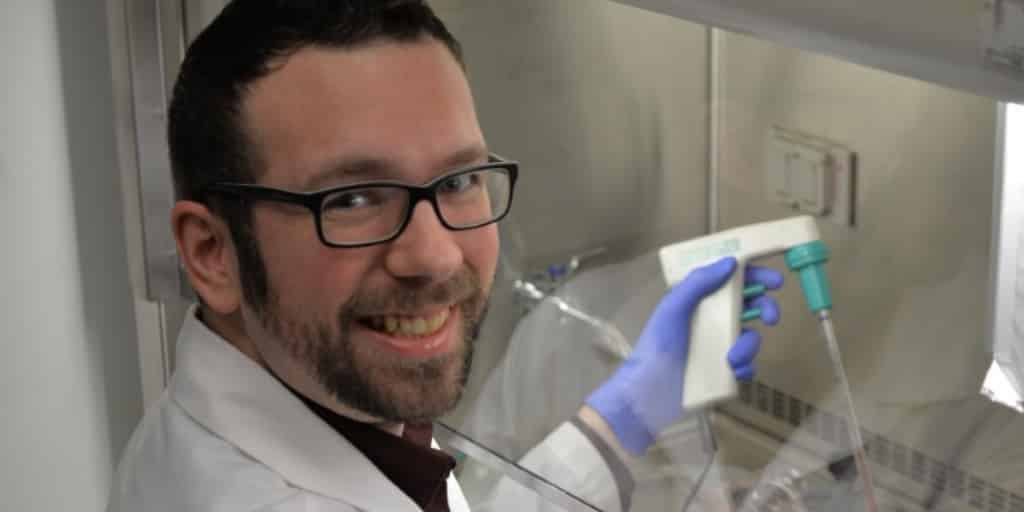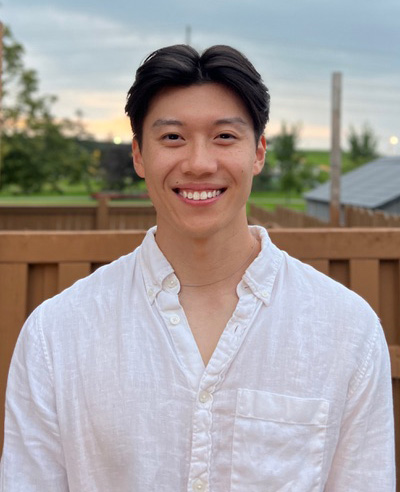1. Who are you? Tell us about yourself.
I am Dr. Ryan Holloway, a postdoctoral fellow under the supervision of Dr. Paola Marignani at Dalhousie University. I also received my Ph.D. (Pathology), MSc. (Biochemistry), and undergraduate degree (Biology) at Dalhousie University.
2. Why is your BCSC research grant important to you?
The financial support from the BCSC research grant is critical for allowing scientific research to occur. Research not only requires a significant amount of time, energy and focus but a tremendous amount of financial resources. We are grateful for the support we receive from BCSC that will allow us to continue to work diligently towards improving the lives of those affected by breast cancer.
3. Tell us about your research.
In the Marignani Discovery Research Laboratory, my research project is a preclinical assessment of combinations of therapeutics. That target the molecular mechanisms that contribute to the development and recurrence of HER2+ breast cancer. This breast cancer is characterized by the overexpression of the HER2 cell surface protein that regulates cell growth and occurs in 20-30% of all breast cancers. Although it is one of the most aggressive breast cancers in terms of growth and metastasis, treatments for this cancer have reasonable success rates; however, recurrence does occur. Our objective is to understand the molecular mechanisms that support recurrence and identify new biomarkers associated with recurrence. Our discoveries will facilitate the design of new therapeutic strategies.
4. What are you doing, and what problems do you hope to solve?
I am using various drugs (mono-therapies) or drug combinations (combinatorial therapies) in vivo and in vitro to examine the impact of irregularities in cell survival, metabolism and pro-survival signalling pathways that contribute to the development and recurrence of this cancer. By improving our understanding of the key players involved in HER2+ breast cancer development and recurrence, our research aims to develop novel therapeutic strategies that prevent recurrence from happening.
5. Why is your research important?
Our study aims to identify new biomarkers of cell survival and metabolism that contribute to the recurrence of HER2+ breast cancer. These new biomarkers will allow us to design new therapies that would improve clinical outcomes by blocking HER2, pro-survival pathways and energy metabolism.
6. How can your research be applied in the real world?
The outcome of our study will lead the way for a Phase I clinical trial designed to target proteins that are involved in driving HER2+ breast cancer recurrence, thereby improving the outcome of HER2+ breast cancer.
7. What inspired your research?
Our group previously discovered that a high percentage of patient primary tumours that express elevated levels of HER2+ also lacked the expression of the tumour suppressor LKB1, which leads to the hyperactivation of mTOR, a key regulator of cell metabolism, growth, and survival. This finding led to the development of a new spontaneous mouse model of HER2+ breast cancer that we used to better understand the role of LKB1 in cancer cell metabolism, cancer development and pro-survival of cancer cells. By understanding the impact of the absence of LKB1 expression in HER2+ breast cancer, we can improve the strategies used to treat patients.
8. Why are you passionate about breast cancer research?
After having my own experience with cancer, I understand the situations that those affected with breast cancer go through, and the impact research has in giving hope to those fighting this disease.
9. Why do you think breast cancer research matters?
Breast cancer is one of the most common types of cancer in Canadian women. It is estimated that 1 in 8 women are expected to develop breast cancer in their lifetime, and 1 in 33 will die from it. With the occurrence of this cancer being so high, we need more strategies to improve diagnosis, more precise treatments and strategies to prevent recurrence.
10. What excites you about your work?
My expertise is in a field referred to as signal transduction, which is trying to understand how cells communicate with each other or amongst themselves. I am always fascinated by the complexity of the signalling networks and how these are disrupted in cancer cells. I enjoy working on solving how to fix these abnormal signalling pathways, which is always an exciting challenge for me.
11. What do you see yourself doing in the future?
As most of my scientific experience had focused on cancer therapeutics, I would like to continue this path and focus on finding solutions to some critical issues in cancer therapeutics, such as how to prevent chemo-resistance and cancer recurrence.
12. What do you like to do when you aren’t working on research?
As my colleagues could tell you, I am well-known to enjoy baking and cooking. Aside from being a ‘foodie’, I enjoy music, movies, craft beer and wine tasting.
Support researchers like Dr. Ryan Holloway by considering a donation to the Breast Cancer Society of Canada.
Find out how you can help fund life-saving research, visit bcsc.ca/donate today.




